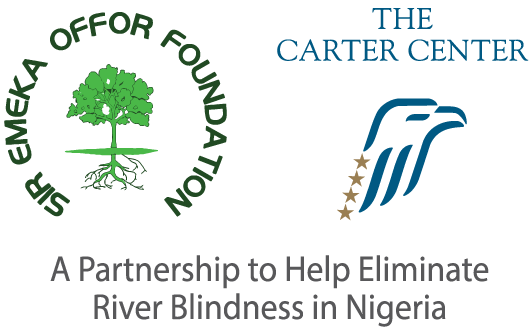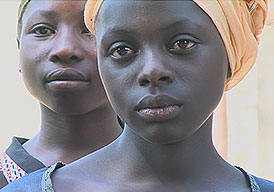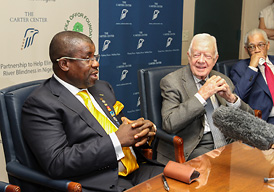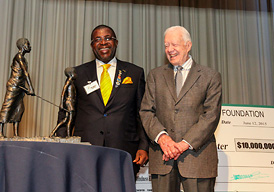
Contacts: Emily Staub, The Carter Center, Tele: +1 404-420-5126, emily.staub@emory.edu
Dr. Edwin Ndukwe, Sir Emeka Offor Foundation edwin.ndukwe@thechromegroup.net
ATLANTA…Former U.S. President Jimmy Carter and businessman Sir Emeka Offor signed an agreement today for a partnership to eliminate river blindness (onchocerciasis) from seven states in Nigeria where The Carter Center works with the Federal Ministry of Health, including Sir Emeka's native state, Anambra. The project is made possible by grant support of USD$10 million from the Sir Emeka Offor Foundation (SEOF). It will help reach the goal of eliminating river blindness from the world's most endemic country by 2020.
"The new resources from the Sir Emeka Offor Foundation will extend the reach of the Carter Center's work in South East and South South Nigeria and help accelerate river blindness elimination throughout Nigeria at a pivotal time," said former U.S. President Jimmy Carter, whose health programs have actively collaborated with the government of Nigeria to eliminate and control diseases in Africa's most populous country since 1988.
The $10 million multi-year commitment by Sir Emeka is the largest grant from an individual African donor in Carter Center history, and the new resources will fund two-thirds of the Carter Center's expanded interventions against river blindness in Nigeria to help meet the five-year target to eliminate river blindness nationwide. Since 2013, with an initial gift of $250,000, the SEOF has been a valued partner to the Center's River Blindness Elimination Program, helping to change the face of philanthropy and inspire more African engagement and support.
"I am deeply honored to work closely with The Carter Center, through the Sir Emeka Offor Foundation to help eliminate river blindness in Nigeria," said Sir Emeka, founder and chairman of the SEOF, a charitable organization focused on health, education, and empowerment in Sub-Saharan Africa. "Nigeria has more cases of river blindness than any other country in the world. Yet, we know that with adequate resources, hard work, and perseverance, we can defeat this terrible neglected disease that can steal a person's ability to see the beauty of the world in which we live and to enjoy a full and active life."
At the Atlanta-based Carter Center, more than 300 individuals from the Atlanta and international communities attended the official signing ceremony and learned more about river blindness elimination efforts. Spread by the bites of infected black flies that breed in rapidly flowing streams, the river blindness parasite causes dreadful eye and skin disease affecting millions of the poorest people in 36 countries in Africa, Latin America, and Yemen.
TURNING POINTS IN NIGERIA'S EFFORTS TO ELIMINATE RIVER BLINDNESS
The Carter Center began a partnership with Nigeria to reduce the prevalence of neglected diseases, such as river blindness, knowing that the Center's assistance could make great impact in Africa's most populous country. Nearly half of the world's river blindness cases are in Nigeria; it is estimated that up to 31 million Nigerians need treatment to prevent unnecessary suffering caused by this ancient disease.
For nearly two decades, The Carter Center has assisted the Nigerian Ministry of Health in nine states to fight river blindness in this highly endemic country through community-based health education and mass drug administration of Mectizan®, a microfilarial drug donated by the U.S. pharmaceutical company Merck. Until recently, scientific communities widely believed that river blindness could not be eliminated with drugs and health education alone in Africa, in part due to its high prevalence and the challenges to delivering health services in the very remote areas afflicted by the condition.
In February 2013, the Federal Minister of Health of Nigeria announced the country's bold goal of nationwide elimination of river blindness by 2020. Formally moving from control to elimination is a turning point in Nigeria's river blindness strategy, requiring that intervention efforts intensify to wipe out once and for all the parasite causing the disease. Unlike in a control program, success in an elimination program means a country's precious health resources can be freed and reallocated to fight other diseases.
"Since its inception in 1996, the Carter Center's River Blindness Program has improved coverage, increased the population it assists, and shown great impact on disease prevalence in Nigeria. Today's unprecedented donation from Sir Emeka Offor Foundation will allow us to ramp up the program and close in on elimination, impacting many more people in southern Nigeria," said Dr. Emmanuel Miri, country representative of the Carter Center's health programs in Nigeria. "With SEOF and the Nigerian government, we believe we can surpass the caliber of success we've already demonstrated and will meet the 2020 river blindness elimination target in the states where we work."
In 2014, the Center assisted the Nigerian Ministry of Health to provide health education and Mectizan treatment to nearly 7 million people in more than 16,000 villages.
In accordance with the national plan, the Nigeria Onchocerciasis Elimination Expert Advisory Committee was inaugurated in May 2015.
SEOF SPURS INCREASED ACTION
"In South East and South South Nigeria, we still face challenges in the fight against river blindness," said Dr. Frank O. Richards, Jr., director of the Carter Center's river blindness, lymphatic filariasis, and schistosomiasis programs. "We still have evidence that children are being infected, and we can still find infected black flies. So the Center's strengthened partnership with the Sir Emeka Offor Foundation is really a critical catalyst to further the momentum of stopping this transmission cycle, and in doing so, eliminating river blindness in the areas where we work."
The elimination strategy requires treating all at-risk populations once or twice a year with Mectizan. The Offor Foundation's contributions will help implement the necessary elimination strategies, such as better coverage and more frequent treatment, in the southern states of: Abia, Anambra, Delta, Ebonyi, Edo, Enugu, and Imo.
The Carter Center will enhance elimination efforts by assisting the Nigerian Ministry of Health to increase distribution of Mectizan, moving from once-a-year to twice-a-year treatments whenever necessary and starting drug distribution in previously untreated areas.
Globally, The Carter Center is helping to eliminate river blindness in Uganda, and in areas of Nigeria, Sudan, and Ethiopia. The Center also leads the coalition to eliminate river blindness from the Americas.
STRONG PARTNERSHIPS
The engagement of a wide range of partners remains critical to the elimination of river blindness in Nigeria, including the communities and the Nigerian Federal Ministry of Health. Other donors and partners of the Carter Center's River Blindness Program in Nigeria have included Merck and its Mectizan Donation Program; the World Health Organization (WHO) and the WHO-World Bank African Programme for Onchocerciasis Control (APOC); the Bill & Melinda Gates Foundation; the Sir Emeka Offor Foundation; the Lions Clubs International Foundation; the U.S. Agency for International Development (USAID); RTI International; the U.S. Centers for Disease Control and Prevention; Mr. John J. Moores; the former River Blindness Foundation; The Margaret A. Cargill Foundation; Mr. and Mrs. Henry McConnon; the A. G. Leventis Foundation; and many other generous donors and partners.
###
SIR EMEKA OFFOR FOUNDATION
In the late-1990s, Sir Emeka Offor established the Sir Emeka Offor Foundation (SEOF), a non-profit, charitable organization, with a vision to reduce poverty and create life-improving economic opportunities for those residing in Nigeria's most marginalized communities through education, health, and empowerment.
Website http://www.sireofforfoundation.org/ | Facebook facebook.com/siremekaofforfoundation | Twitter @SirE_Foundation | YouTube youtube.com/sireofforfoundation
"Waging Peace. Fighting Disease. Building Hope."
A not-for-profit, nongovernmental organization, The Carter Center has helped to improve life for people in over 80 countries by resolving conflicts; advancing democracy, human rights, and economic opportunity; preventing diseases; and improving mental health care. The Carter Center was founded in 1982 by former U.S. President Jimmy Carter and former First Lady Rosalynn Carter, in partnership with Emory University, to advance peace and health worldwide.

Partnership Brings New Hope to Nigeria

A press conference attended by former U.S. President Jimmy Carter and Sir Emeka Offor, Nigerian businessman and founder of the Sir Emeka Offor Foundation, was held to discuss a partnership — solidified by a $10 million grant — to help eliminate river blindness (onchocerciasis) from seven states in Nigeria.

Jimmy Carter presents Sir Emeka Offor with a statue depicting a child leading a blind man as a result of the debilitating effects of the disease river blindness. (All photos: The Carter Center/ C. Joe)
Please sign up below for important news about the work of The Carter Center and special event invitations.